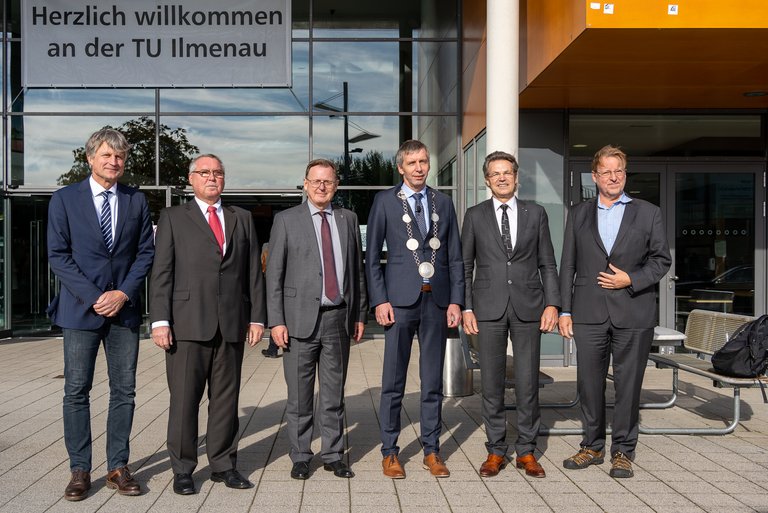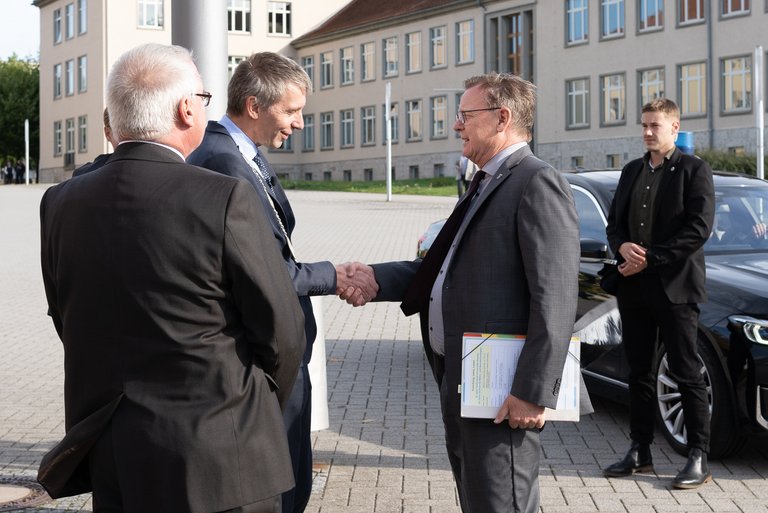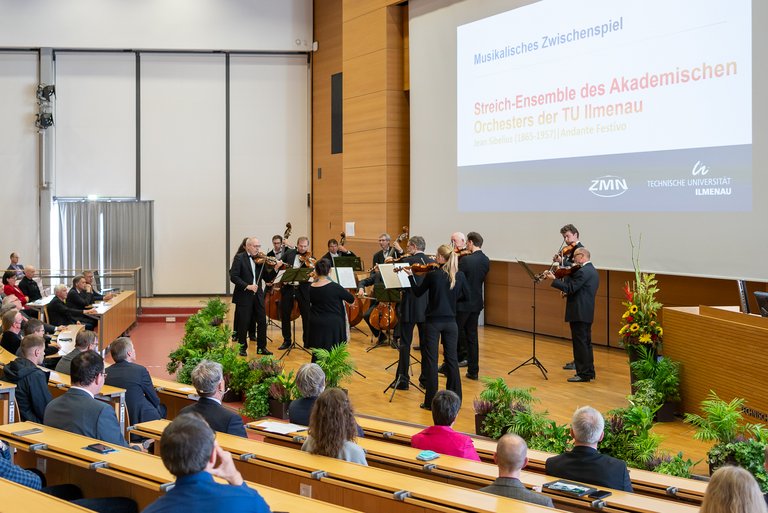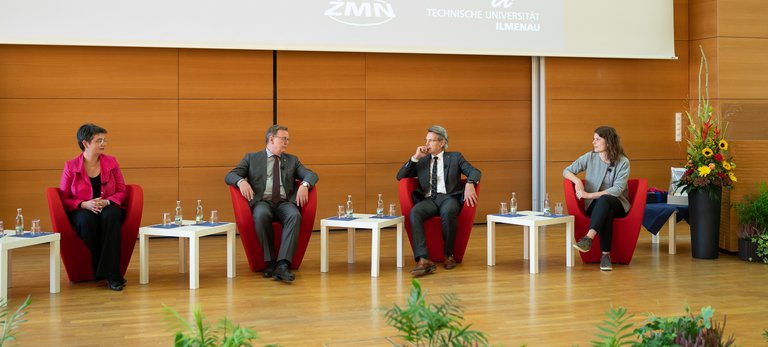30 years ago, the Thuringian state parliament granted the then "Technische Hochschule Ilmenau" the status of a technical university by higher education law. Ten years later, the Center for Micro and Nanotechnologies (ZMN) was opened, the largest technological center of the TU Ilmenau to date. The university took this double anniversary - 30 years of TU Ilmenau and 20 years of the Center for Micro and Nanotechnologies - as an opportunity to look back on the successful development of the past years - but also to take a look into the future of research and teaching in an international context - together with Thuringia's Minister President Bodo Ramelow at a festive event.
"Research, teaching, life": University celebrates 30 years of TU Ilmenau and 20 years of ZMN

When the Science Council recommended in July 1991 that the then "Technische Hochschule Ilmenau" be granted the status of a technical university and the university was officially renamed "Technische Universität Ilmenau" in a ceremonial act on October 17, 1992, this was "undoubtedly recognition of many years of outstanding work in research and teaching as well as a high - also international - reputation" of the university", but "at the same time also a mission for the future". With these words, University President Prof. Kai-Uwe Sattler opened the anniversary celebration on October 5 in the Audimax of TU Ilmenau. He took the anniversary as an opportunity to highlight the successes, but also the importance of the university as a driver of innovation for society: "We are aware of our role and responsibility for the region as the only technical university in Thuringia." For example, he said, not only have more than 22,000 degrees been awarded in the past 30 years, including nearly 2,500 to international students, but also more than 220 spin-offs have emerged from TU Ilmenau. In the last ten years alone, the university can point to research contracts from over 370 companies and joint projects with over 770 companies from Thuringia and the entire Federal Republic. In addition, the university's scientists have raised more than 750 million euros in third-party funding since 1992: "With approximately 420,000 euros per year and professorship, we belong to the top group of German universities!" Currently, he said, the TU Ilmenau is not only involved in a collaborative research center on biologically inspired electronics, but is also coordinating a DFG Research Training Group for 3D nanofabrication in large areas, two priority programs and other major projects of the Carl Zeiss Foundation, the German federal government, the German Research Foundation (DFG) and the state of Thuringia on future topics such as quantum technologies, mobility of the future, energy systems, medical technology, artificial intelligence or crisis communication.
"Their strength is also our strength"
The importance of the cutting-edge research of the "turbocharger Ilmenau" in times of crisis was also emphasized by Minister President Bodo Ramelow in his greeting: Especially in crises such as the corona pandemic or the price crisis in energy, the scientists of the TU Ilmenau provided important answers for politics, economy and society. As an example, he cited the know-how of the Thuringian Energy Research Institute (ThEFI) in direct current technology: "I am here with all my heart because I know: your strength is also our strength and your regionality is our quality." The innovations from the TU Ilmenau and the "climate of openness to new ideas, where people count," as well as the internationality of the university, can be felt everywhere in the city, he said. "What is a city and what is a university?" the prime minister asked. Both merge in Ilmenau, he said.
Committed employees and students and strong partnerships as the university's "speciality and capital".
According to Prof. Sattler, this is primarily due to the "very committed scientists, employees and students" and the "team spirit", which "are the special feature and capital of this university", but also to the strong national and international partnerships in research and teaching: "We are very well networked - with other universities, with research institutions, with companies as research partners, with the region. Our four affiliated institutes TITK, iba, CiS and IMMS support us as strategic transfer partners in transferring research results into practice." In the future, he said, the university will be even more international and will continue to develop its profile in new directions.
Using the Center for Micro and Nanotechnologies as an example, the university president and the head of ZMN, Prof. Peter Schaaf, highlighted interdisciplinarity in research and teaching as another strength of the university: at the largest technical center of the TU Ilmenau, scientists from around 40 disciplines and four faculties have been researching future topics such as energy-saving "green electronics" in state-of-the-art special laboratories and clean rooms since 2002. With 1,200 square meters of space for highly specialized systems and equipment, the ZMN ranks first in Europe among university cleanrooms and, together with universities such as Caltech or Harvard, is among the top 10 worldwide. "But that's not enough for us"; says Prof. Schaaf, "we have to think ahead": for example, in the future, in the sense of a circular economy, the design of electronics, sensor technology, IT or biomedical technology must already be made repair- and recycling-friendly, and critical elements must be saved in the production of devices, and the possibilities for repair, component replacement or disassembly for raw material-friendly recycling must already be thought of and built in.
In his keynote speech, Prof. Frank Mücklich, Professor of Functional Materials at Saarland University and spokesman for the acatech - German Academy of Science and Engineering Network for Materials Science and Engineering, also emphasized the importance of materials science as one of the key technologies for society's megatopics: "Increasing economic output must no longer be at the expense of resource consumption and environmental pollution. For this reason, research is being carried out together with various departments at the TU Ilmenau, including innovative technologies for laser materials processing.
"The university must not remain an ivory tower"
The desire to address the topic of sustainability in teaching and to take it into society was expressed by PhD student Jasmin Calmbach in the concluding panel discussion on the topic of "Research and teaching in an international context - the university after the turn of the millennium". She said that the university should not remain an ivory tower, but that what is researched at the university should also be communicated to society in a comprehensible way.
Prof. Anja Geigenmüller, Vice President for Studies and Teaching and Professor of General Business Administration, in particular Marketing, at TU Ilmenau, was confident that this would succeed: "We are known for what we do very well, but we are not satisfied with that and are responding to the changing labor market and global context," she said, referring to the new developments. The need to respond to societal challenges was also underlined by Bodo Ramelow in his closing statement, "It's not just Fridays for Future that are waiting for something to change. The globe is crying out every day," said the prime minister. These processes of change have an anchor, he said, and that anchor is science and truthfulness. "The ancient ability to question critically is something that will be our compass through time."
Prof. Sattler expressed it similarly in his outlook on the future of the university: "Let us preserve this university aspiration and the curiosity associated with it - and necessary for science - and also convey it to our students - even in times of ECTS points, social media and new, digital teaching formats. The freedom to try out ideas and things, to look into other areas, is what makes a university."





